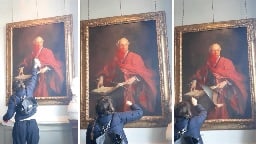Historic Portrait of Lord Balfour Slashed by Pro-Palestine Protestors



news.artnet.com
A painting of Lord Balfour housed at the University of Cambridge’s Trinity College was slashed by protest group Palestine Action.
The painting of Lord Balfour was made in 1914 by Philip Alexius de László inside Trinity College. The Palestine Action group specifically targeted the Lord Balfour painting, describing his declaration as the beginning of “ethnic cleansing of Palestine by promising the land away—which the British never had the right to do.”
You are viewing a single comment
Probably the only type of destruction of art as protest I condone. The piece:
Trying to destroy unrelated art work is just wasteful of our shared human heritage. Attacking symbols of oppression however is perfectly valid in my opinion and is to me perfectly reasonable escalation when peaceful protests obviously do not bring the changes needed.
I put this on the same level as African Americans attacking statues of confederate generals and other proponents of slavery to hammer home their point.
About where I'm at. Normally I get immensely irritated by 'protesters' who go and vandalize unrelated and historically important artwork, but this isn't particularly objectionable.
I mean, correct me if I’m wrong, but this is the first story I’ve seen of protestors actually destroying the painting itself, they’re usually splashing paint on the protective cover, not on the painting itself. I’ve never seen one where the actual art was destroyed before now. Is that what you’re talking about? Or am I missing a bunch of stories where unrelated artwork was destroyed by protestors (usually climate protesters)?
My youngest son tore up one of his brothers drawings because he had to get a bath first last night but it doesn’t seem to be reported on anywhere so I can’t fault you for not knowing about it.
These damn gen alphas and their civil disobedience
Well they didn't need to bother protecting the portrait because it wasn't culturally relevant and no one would particularly care if it was accidentally damaged or aged.
I so wanted to be annoyed yet again by annoying people, but …. Huh, the artwork they destroyed is relevant to their cause, as is destroying it. I’m still not ok with destruction as a form of protest, but there’s a reasonable line of logic
Mood. I'm a curmudgeon and was looking forward at shaking my cane at some vandals, but here they are putting thought into things.
Agreed, except that I would call this peaceful protest. Vandalism isn't violence. Violence is against a person. As long as no person was relying on this painting for their meals or shelter or whatever - and they definitely weren't - then no person was harmed.
No no no, you don't understand. Violence is everything that disturbs those in power!
Mediocre art being damaged in one of the centers of power is violence.
Tens of thousands of people somewhere else dying is just a minor inconvenience.
so vandalism is in fact violence if you rely on the object? Like your car, your house, your bike...
Depends really, it's all deeply contextual. A landlord kicking a family out because they can't make rent is violence. Cops destroying an encampment of the unhoused is violence. Those people are hurt by those actions, even if not immediately.
It's not about reliance exactly, but about harm to people. Any action that can reasonably be assumed to harm a person is violent. Pulling a lever isn't violent, unless it's the trigger of a gun aimed at someone. Then a series of predictable physical processes unfold that lead to serious harm.
Breaking a plank of wood isn't violence, even if it belongs to someone else. That's just property destruction. But if someone was standing on that plank of wood and they fall to their death, you killed them.
Another important detail to consider is that these pieces are really only worthwhile for their historical value. I would argue that this response is more significant than the original production of the painting.
If anything, the value of this painting will increase due to the added historical value of this event.
actually later on this will add more historical value to it.
Definitely. Historic or not, don't put bad people on pedestals. E.g. there's a reason why you don't see statues of Hitler in Germany.
But you do have statues of Bismarck for instance. Who also "set in motion" the holocaust, as much as this guy the current situation in Gaza.
Both did things that some 50 to 100 years later ended in death of innocent people.
So did Charlemagne. Wait he actually committed genocide himself in the war against the Saxons. It's not what they're remembered for, though.
I just want to point out that most of the other time you hear about "attacks" on art the piece is perfectly fine. They'll attack pieces shielded by glass. It makes a statement and does no damage (maybe a little mess to clean up). Like the recent Mona Lisa "attack" you can't miss that it's covered by glass as you're spending 30m getting closer. It wasn't a mistake that no damage was done.
I do agree in this case it's fairly justified. This man doesn't deserve to be remembered fondly.
Ok, ya got me.
They can burn this picture of some dead asshole for all I care.
I will say though, I doubt it's particularly effective at drawing undecideds to the cause.
If they made a single person google the Balfour Declaration I'm pretty sure they won the exchange. Now you're getting to get a split of people reading just the Declaration, which seems harmless enough, and people reading what it actually did, which was anything but harmless, but you can't control that.